Cognitive Psychology: Unconscious Stimuli, Priming, and Attention
VerifiedAdded on 2023/01/16
|8
|1823
|26
Report
AI Summary
This report delves into cognitive psychology, examining the influence of unconscious stimuli on conscious behavior, the mechanisms of priming and repetition priming, and the factors affecting semantic activation. It explores how emotional valence impacts word processing and how spare cognitive resources influence stimulus processing. The report also addresses individual differences in response to stimuli and presents three key hypotheses related to these concepts. The study involved 65 participants from the University of Melbourne, who completed a series of tasks to investigate these cognitive processes. The findings highlight the interplay between conscious and unconscious minds, the impact of priming on response times, and the variability in individual responses to the same stimuli. The report concludes with a discussion of the limitations, including a lack of prior research and the use of self-reported data, and offers insights into the practical implications of cognitive psychology.
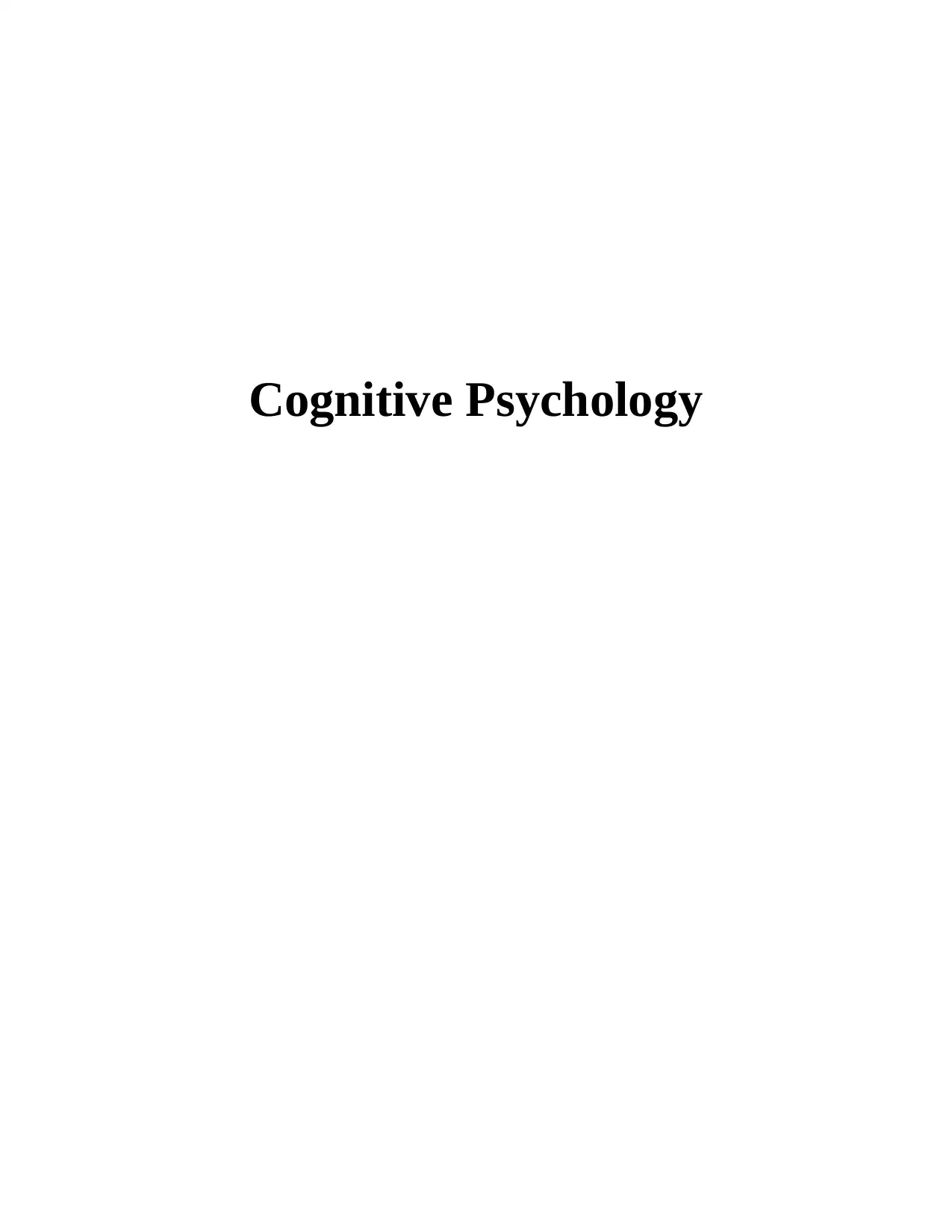
Cognitive Psychology
Paraphrase This Document
Need a fresh take? Get an instant paraphrase of this document with our AI Paraphraser
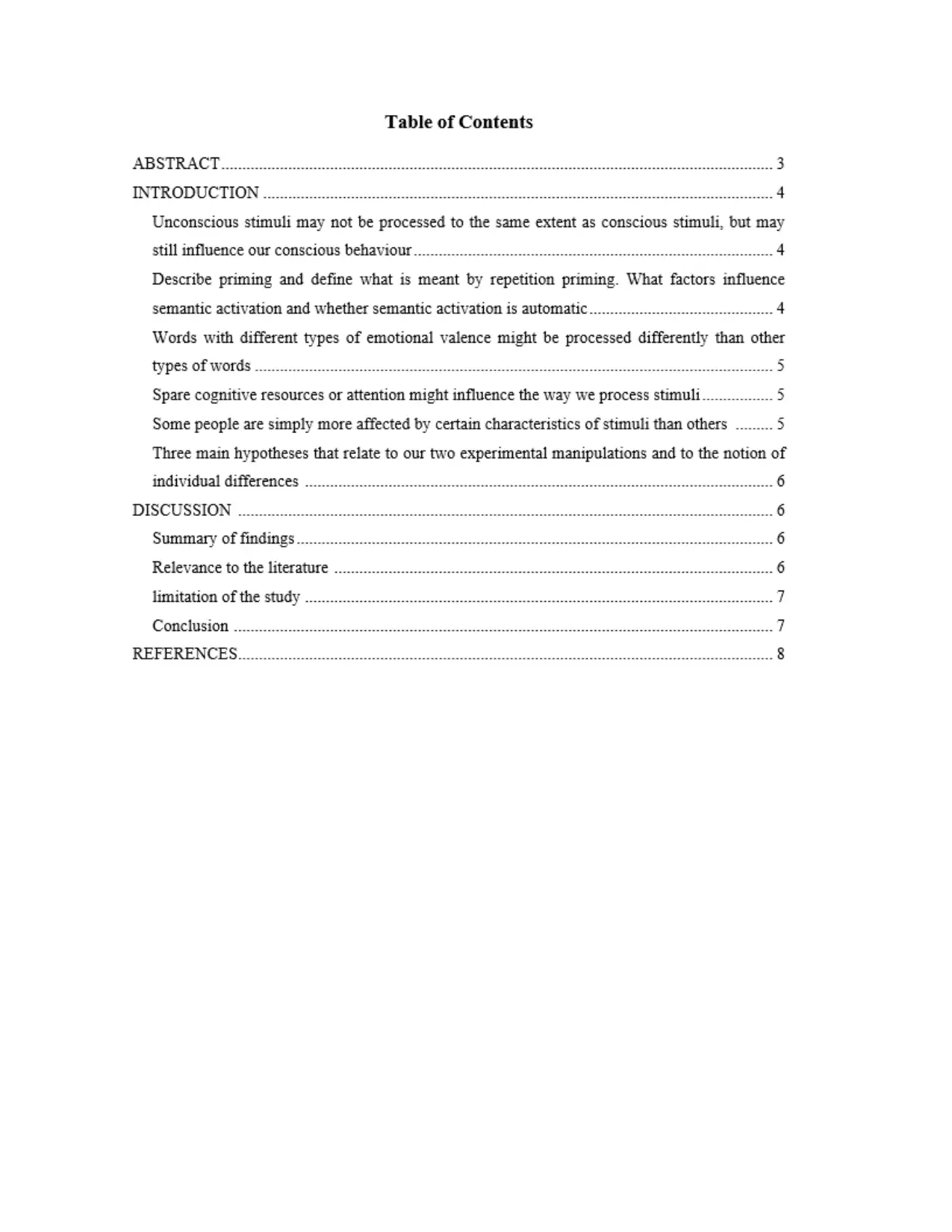
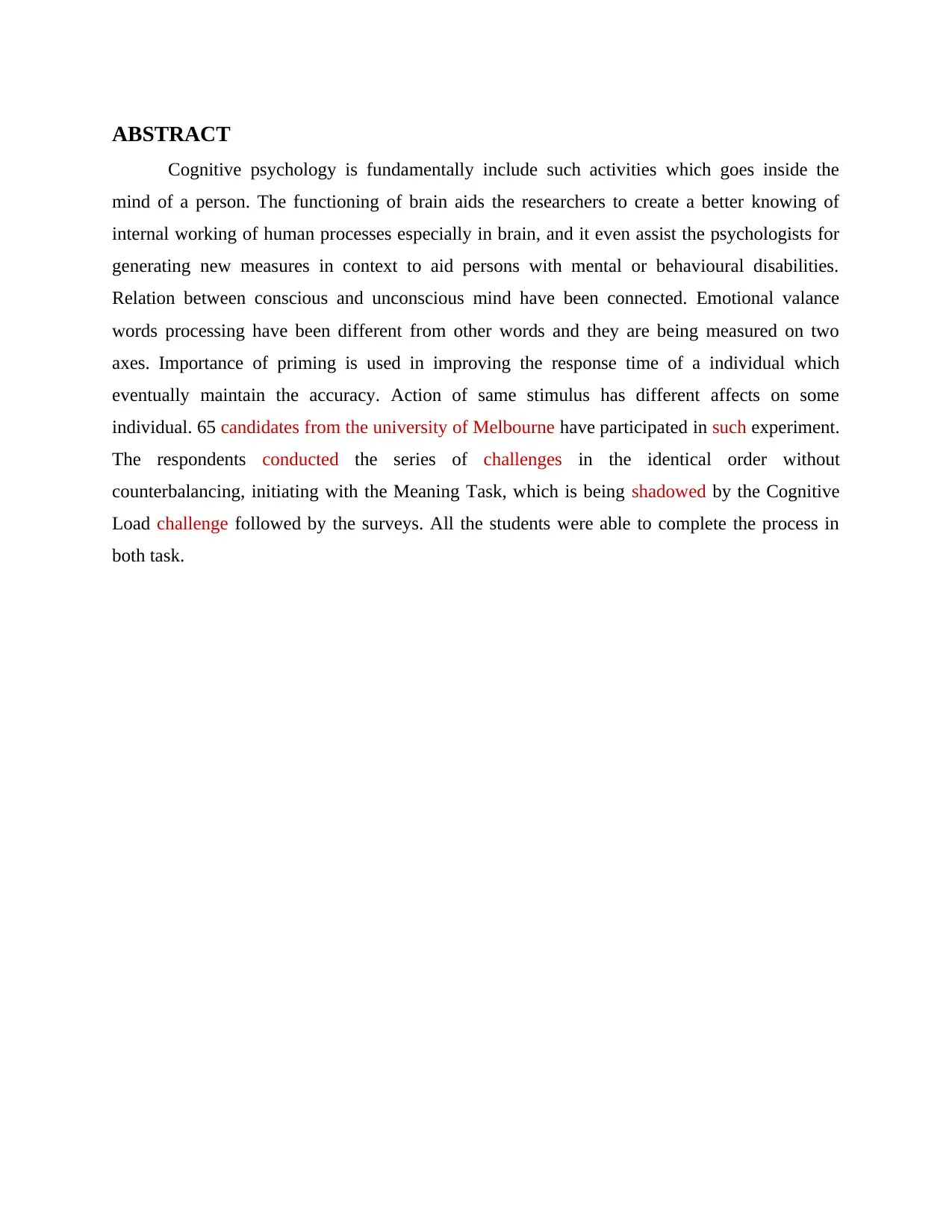
ABSTRACT
Cognitive psychology is fundamentally include such activities which goes inside the
mind of a person. The functioning of brain aids the researchers to create a better knowing of
internal working of human processes especially in brain, and it even assist the psychologists for
generating new measures in context to aid persons with mental or behavioural disabilities.
Relation between conscious and unconscious mind have been connected. Emotional valance
words processing have been different from other words and they are being measured on two
axes. Importance of priming is used in improving the response time of a individual which
eventually maintain the accuracy. Action of same stimulus has different affects on some
individual. 65 candidates from the university of Melbourne have participated in such experiment.
The respondents conducted the series of challenges in the identical order without
counterbalancing, initiating with the Meaning Task, which is being shadowed by the Cognitive
Load challenge followed by the surveys. All the students were able to complete the process in
both task.
Cognitive psychology is fundamentally include such activities which goes inside the
mind of a person. The functioning of brain aids the researchers to create a better knowing of
internal working of human processes especially in brain, and it even assist the psychologists for
generating new measures in context to aid persons with mental or behavioural disabilities.
Relation between conscious and unconscious mind have been connected. Emotional valance
words processing have been different from other words and they are being measured on two
axes. Importance of priming is used in improving the response time of a individual which
eventually maintain the accuracy. Action of same stimulus has different affects on some
individual. 65 candidates from the university of Melbourne have participated in such experiment.
The respondents conducted the series of challenges in the identical order without
counterbalancing, initiating with the Meaning Task, which is being shadowed by the Cognitive
Load challenge followed by the surveys. All the students were able to complete the process in
both task.
⊘ This is a preview!⊘
Do you want full access?
Subscribe today to unlock all pages.

Trusted by 1+ million students worldwide
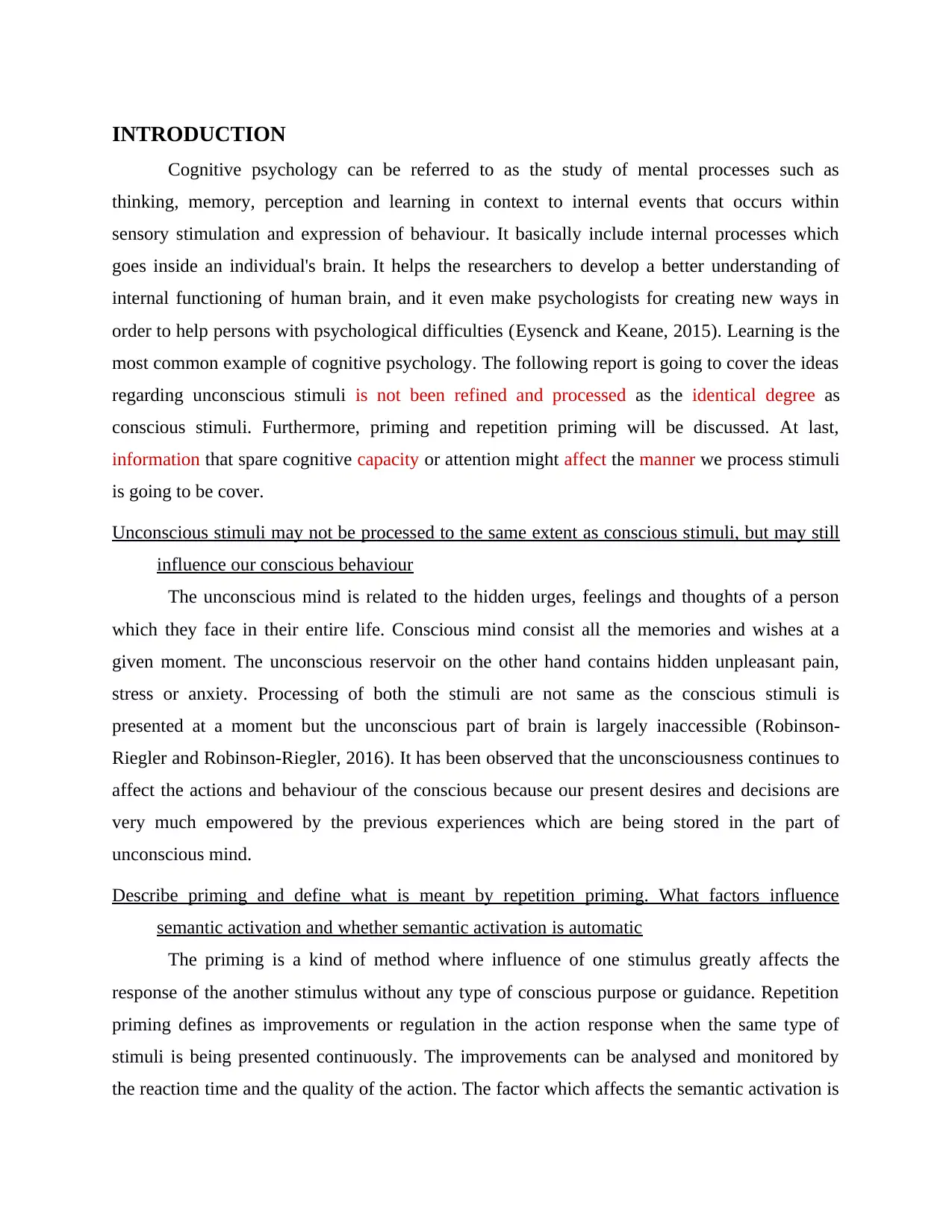
INTRODUCTION
Cognitive psychology can be referred to as the study of mental processes such as
thinking, memory, perception and learning in context to internal events that occurs within
sensory stimulation and expression of behaviour. It basically include internal processes which
goes inside an individual's brain. It helps the researchers to develop a better understanding of
internal functioning of human brain, and it even make psychologists for creating new ways in
order to help persons with psychological difficulties (Eysenck and Keane, 2015). Learning is the
most common example of cognitive psychology. The following report is going to cover the ideas
regarding unconscious stimuli is not been refined and processed as the identical degree as
conscious stimuli. Furthermore, priming and repetition priming will be discussed. At last,
information that spare cognitive capacity or attention might affect the manner we process stimuli
is going to be cover.
Unconscious stimuli may not be processed to the same extent as conscious stimuli, but may still
influence our conscious behaviour
The unconscious mind is related to the hidden urges, feelings and thoughts of a person
which they face in their entire life. Conscious mind consist all the memories and wishes at a
given moment. The unconscious reservoir on the other hand contains hidden unpleasant pain,
stress or anxiety. Processing of both the stimuli are not same as the conscious stimuli is
presented at a moment but the unconscious part of brain is largely inaccessible (Robinson-
Riegler and Robinson-Riegler, 2016). It has been observed that the unconsciousness continues to
affect the actions and behaviour of the conscious because our present desires and decisions are
very much empowered by the previous experiences which are being stored in the part of
unconscious mind.
Describe priming and define what is meant by repetition priming. What factors influence
semantic activation and whether semantic activation is automatic
The priming is a kind of method where influence of one stimulus greatly affects the
response of the another stimulus without any type of conscious purpose or guidance. Repetition
priming defines as improvements or regulation in the action response when the same type of
stimuli is being presented continuously. The improvements can be analysed and monitored by
the reaction time and the quality of the action. The factor which affects the semantic activation is
Cognitive psychology can be referred to as the study of mental processes such as
thinking, memory, perception and learning in context to internal events that occurs within
sensory stimulation and expression of behaviour. It basically include internal processes which
goes inside an individual's brain. It helps the researchers to develop a better understanding of
internal functioning of human brain, and it even make psychologists for creating new ways in
order to help persons with psychological difficulties (Eysenck and Keane, 2015). Learning is the
most common example of cognitive psychology. The following report is going to cover the ideas
regarding unconscious stimuli is not been refined and processed as the identical degree as
conscious stimuli. Furthermore, priming and repetition priming will be discussed. At last,
information that spare cognitive capacity or attention might affect the manner we process stimuli
is going to be cover.
Unconscious stimuli may not be processed to the same extent as conscious stimuli, but may still
influence our conscious behaviour
The unconscious mind is related to the hidden urges, feelings and thoughts of a person
which they face in their entire life. Conscious mind consist all the memories and wishes at a
given moment. The unconscious reservoir on the other hand contains hidden unpleasant pain,
stress or anxiety. Processing of both the stimuli are not same as the conscious stimuli is
presented at a moment but the unconscious part of brain is largely inaccessible (Robinson-
Riegler and Robinson-Riegler, 2016). It has been observed that the unconsciousness continues to
affect the actions and behaviour of the conscious because our present desires and decisions are
very much empowered by the previous experiences which are being stored in the part of
unconscious mind.
Describe priming and define what is meant by repetition priming. What factors influence
semantic activation and whether semantic activation is automatic
The priming is a kind of method where influence of one stimulus greatly affects the
response of the another stimulus without any type of conscious purpose or guidance. Repetition
priming defines as improvements or regulation in the action response when the same type of
stimuli is being presented continuously. The improvements can be analysed and monitored by
the reaction time and the quality of the action. The factor which affects the semantic activation is
Paraphrase This Document
Need a fresh take? Get an instant paraphrase of this document with our AI Paraphraser
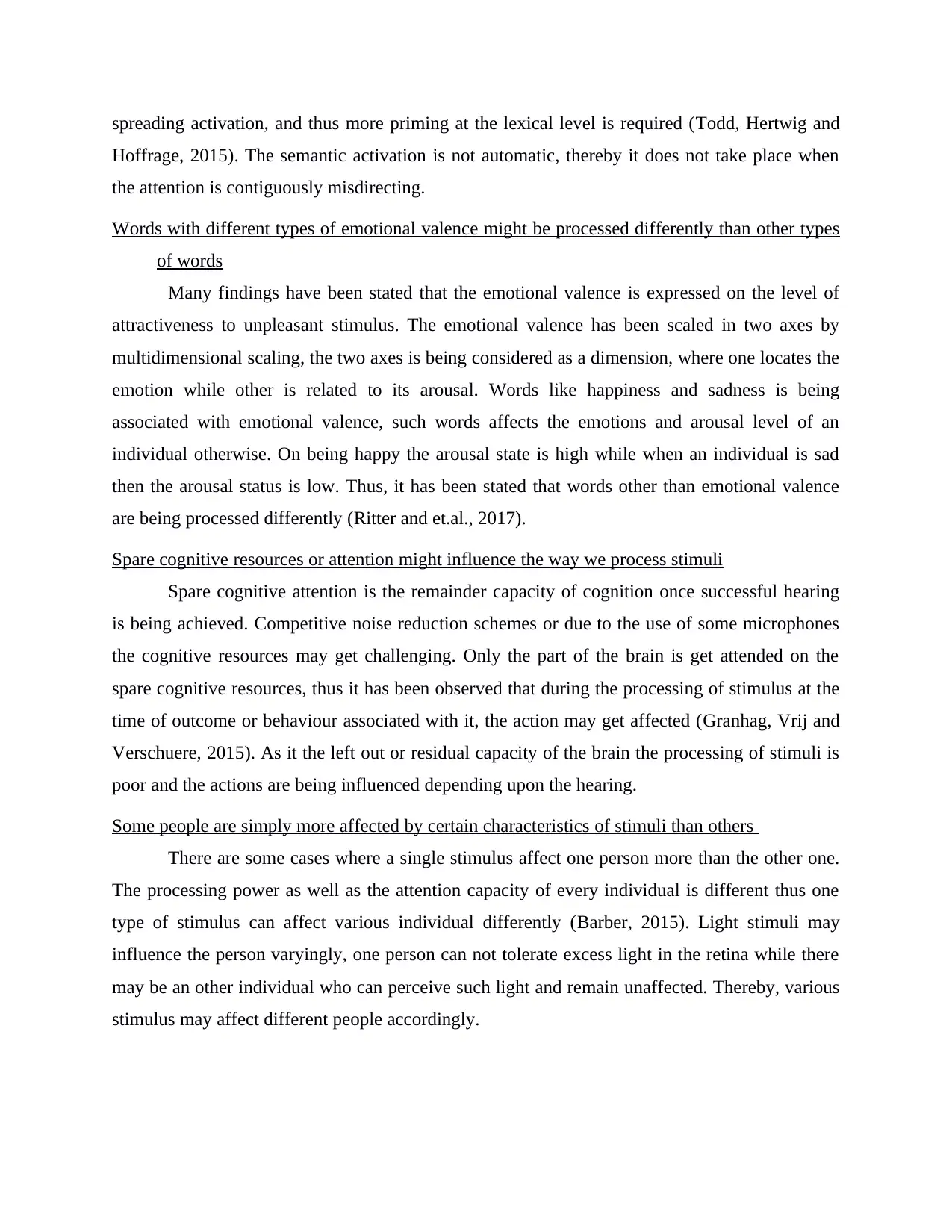
spreading activation, and thus more priming at the lexical level is required (Todd, Hertwig and
Hoffrage, 2015). The semantic activation is not automatic, thereby it does not take place when
the attention is contiguously misdirecting.
Words with different types of emotional valence might be processed differently than other types
of words
Many findings have been stated that the emotional valence is expressed on the level of
attractiveness to unpleasant stimulus. The emotional valence has been scaled in two axes by
multidimensional scaling, the two axes is being considered as a dimension, where one locates the
emotion while other is related to its arousal. Words like happiness and sadness is being
associated with emotional valence, such words affects the emotions and arousal level of an
individual otherwise. On being happy the arousal state is high while when an individual is sad
then the arousal status is low. Thus, it has been stated that words other than emotional valence
are being processed differently (Ritter and et.al., 2017).
Spare cognitive resources or attention might influence the way we process stimuli
Spare cognitive attention is the remainder capacity of cognition once successful hearing
is being achieved. Competitive noise reduction schemes or due to the use of some microphones
the cognitive resources may get challenging. Only the part of the brain is get attended on the
spare cognitive resources, thus it has been observed that during the processing of stimulus at the
time of outcome or behaviour associated with it, the action may get affected (Granhag, Vrij and
Verschuere, 2015). As it the left out or residual capacity of the brain the processing of stimuli is
poor and the actions are being influenced depending upon the hearing.
Some people are simply more affected by certain characteristics of stimuli than others
There are some cases where a single stimulus affect one person more than the other one.
The processing power as well as the attention capacity of every individual is different thus one
type of stimulus can affect various individual differently (Barber, 2015). Light stimuli may
influence the person varyingly, one person can not tolerate excess light in the retina while there
may be an other individual who can perceive such light and remain unaffected. Thereby, various
stimulus may affect different people accordingly.
Hoffrage, 2015). The semantic activation is not automatic, thereby it does not take place when
the attention is contiguously misdirecting.
Words with different types of emotional valence might be processed differently than other types
of words
Many findings have been stated that the emotional valence is expressed on the level of
attractiveness to unpleasant stimulus. The emotional valence has been scaled in two axes by
multidimensional scaling, the two axes is being considered as a dimension, where one locates the
emotion while other is related to its arousal. Words like happiness and sadness is being
associated with emotional valence, such words affects the emotions and arousal level of an
individual otherwise. On being happy the arousal state is high while when an individual is sad
then the arousal status is low. Thus, it has been stated that words other than emotional valence
are being processed differently (Ritter and et.al., 2017).
Spare cognitive resources or attention might influence the way we process stimuli
Spare cognitive attention is the remainder capacity of cognition once successful hearing
is being achieved. Competitive noise reduction schemes or due to the use of some microphones
the cognitive resources may get challenging. Only the part of the brain is get attended on the
spare cognitive resources, thus it has been observed that during the processing of stimulus at the
time of outcome or behaviour associated with it, the action may get affected (Granhag, Vrij and
Verschuere, 2015). As it the left out or residual capacity of the brain the processing of stimuli is
poor and the actions are being influenced depending upon the hearing.
Some people are simply more affected by certain characteristics of stimuli than others
There are some cases where a single stimulus affect one person more than the other one.
The processing power as well as the attention capacity of every individual is different thus one
type of stimulus can affect various individual differently (Barber, 2015). Light stimuli may
influence the person varyingly, one person can not tolerate excess light in the retina while there
may be an other individual who can perceive such light and remain unaffected. Thereby, various
stimulus may affect different people accordingly.
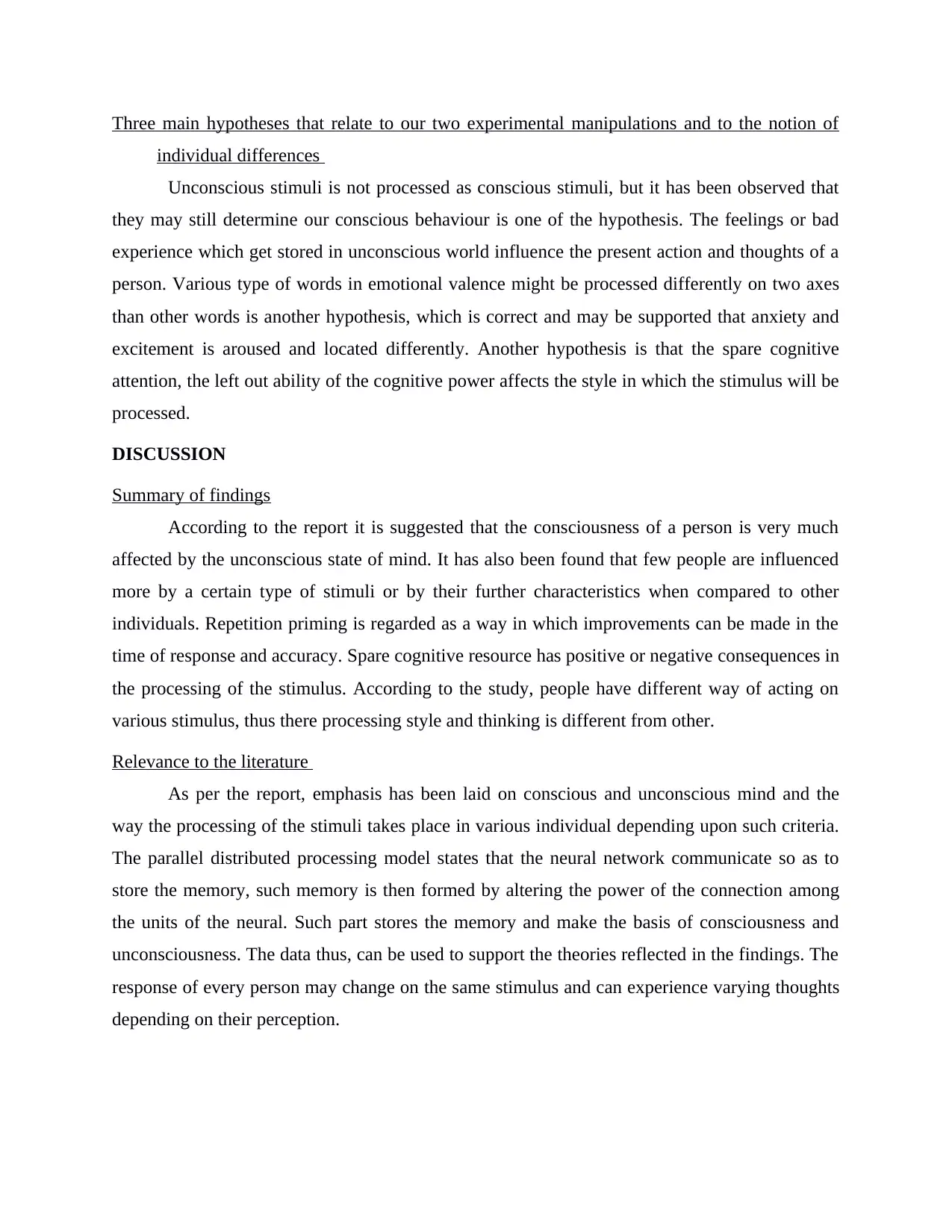
Three main hypotheses that relate to our two experimental manipulations and to the notion of
individual differences
Unconscious stimuli is not processed as conscious stimuli, but it has been observed that
they may still determine our conscious behaviour is one of the hypothesis. The feelings or bad
experience which get stored in unconscious world influence the present action and thoughts of a
person. Various type of words in emotional valence might be processed differently on two axes
than other words is another hypothesis, which is correct and may be supported that anxiety and
excitement is aroused and located differently. Another hypothesis is that the spare cognitive
attention, the left out ability of the cognitive power affects the style in which the stimulus will be
processed.
DISCUSSION
Summary of findings
According to the report it is suggested that the consciousness of a person is very much
affected by the unconscious state of mind. It has also been found that few people are influenced
more by a certain type of stimuli or by their further characteristics when compared to other
individuals. Repetition priming is regarded as a way in which improvements can be made in the
time of response and accuracy. Spare cognitive resource has positive or negative consequences in
the processing of the stimulus. According to the study, people have different way of acting on
various stimulus, thus there processing style and thinking is different from other.
Relevance to the literature
As per the report, emphasis has been laid on conscious and unconscious mind and the
way the processing of the stimuli takes place in various individual depending upon such criteria.
The parallel distributed processing model states that the neural network communicate so as to
store the memory, such memory is then formed by altering the power of the connection among
the units of the neural. Such part stores the memory and make the basis of consciousness and
unconsciousness. The data thus, can be used to support the theories reflected in the findings. The
response of every person may change on the same stimulus and can experience varying thoughts
depending on their perception.
individual differences
Unconscious stimuli is not processed as conscious stimuli, but it has been observed that
they may still determine our conscious behaviour is one of the hypothesis. The feelings or bad
experience which get stored in unconscious world influence the present action and thoughts of a
person. Various type of words in emotional valence might be processed differently on two axes
than other words is another hypothesis, which is correct and may be supported that anxiety and
excitement is aroused and located differently. Another hypothesis is that the spare cognitive
attention, the left out ability of the cognitive power affects the style in which the stimulus will be
processed.
DISCUSSION
Summary of findings
According to the report it is suggested that the consciousness of a person is very much
affected by the unconscious state of mind. It has also been found that few people are influenced
more by a certain type of stimuli or by their further characteristics when compared to other
individuals. Repetition priming is regarded as a way in which improvements can be made in the
time of response and accuracy. Spare cognitive resource has positive or negative consequences in
the processing of the stimulus. According to the study, people have different way of acting on
various stimulus, thus there processing style and thinking is different from other.
Relevance to the literature
As per the report, emphasis has been laid on conscious and unconscious mind and the
way the processing of the stimuli takes place in various individual depending upon such criteria.
The parallel distributed processing model states that the neural network communicate so as to
store the memory, such memory is then formed by altering the power of the connection among
the units of the neural. Such part stores the memory and make the basis of consciousness and
unconsciousness. The data thus, can be used to support the theories reflected in the findings. The
response of every person may change on the same stimulus and can experience varying thoughts
depending on their perception.
⊘ This is a preview!⊘
Do you want full access?
Subscribe today to unlock all pages.

Trusted by 1+ million students worldwide
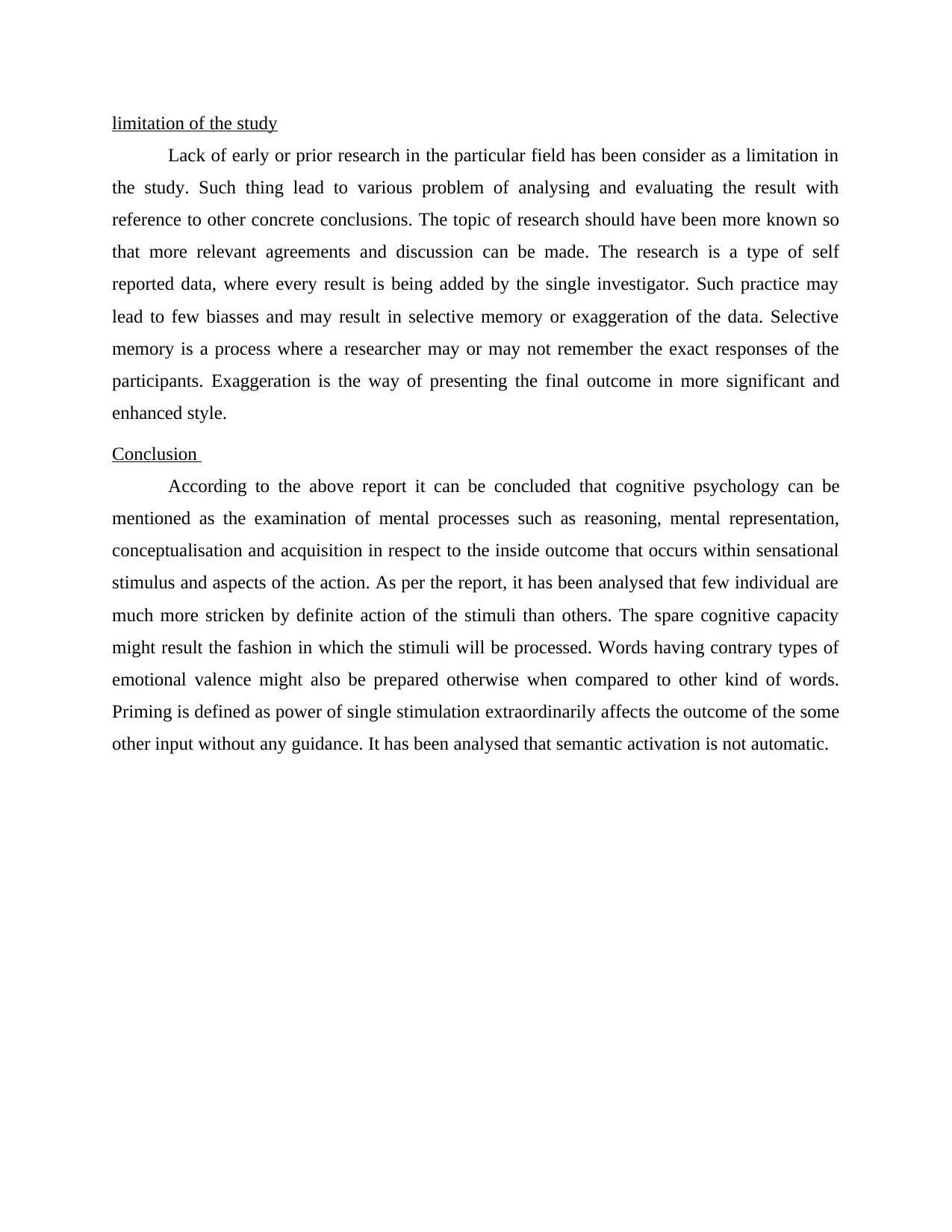
limitation of the study
Lack of early or prior research in the particular field has been consider as a limitation in
the study. Such thing lead to various problem of analysing and evaluating the result with
reference to other concrete conclusions. The topic of research should have been more known so
that more relevant agreements and discussion can be made. The research is a type of self
reported data, where every result is being added by the single investigator. Such practice may
lead to few biasses and may result in selective memory or exaggeration of the data. Selective
memory is a process where a researcher may or may not remember the exact responses of the
participants. Exaggeration is the way of presenting the final outcome in more significant and
enhanced style.
Conclusion
According to the above report it can be concluded that cognitive psychology can be
mentioned as the examination of mental processes such as reasoning, mental representation,
conceptualisation and acquisition in respect to the inside outcome that occurs within sensational
stimulus and aspects of the action. As per the report, it has been analysed that few individual are
much more stricken by definite action of the stimuli than others. The spare cognitive capacity
might result the fashion in which the stimuli will be processed. Words having contrary types of
emotional valence might also be prepared otherwise when compared to other kind of words.
Priming is defined as power of single stimulation extraordinarily affects the outcome of the some
other input without any guidance. It has been analysed that semantic activation is not automatic.
Lack of early or prior research in the particular field has been consider as a limitation in
the study. Such thing lead to various problem of analysing and evaluating the result with
reference to other concrete conclusions. The topic of research should have been more known so
that more relevant agreements and discussion can be made. The research is a type of self
reported data, where every result is being added by the single investigator. Such practice may
lead to few biasses and may result in selective memory or exaggeration of the data. Selective
memory is a process where a researcher may or may not remember the exact responses of the
participants. Exaggeration is the way of presenting the final outcome in more significant and
enhanced style.
Conclusion
According to the above report it can be concluded that cognitive psychology can be
mentioned as the examination of mental processes such as reasoning, mental representation,
conceptualisation and acquisition in respect to the inside outcome that occurs within sensational
stimulus and aspects of the action. As per the report, it has been analysed that few individual are
much more stricken by definite action of the stimuli than others. The spare cognitive capacity
might result the fashion in which the stimuli will be processed. Words having contrary types of
emotional valence might also be prepared otherwise when compared to other kind of words.
Priming is defined as power of single stimulation extraordinarily affects the outcome of the some
other input without any guidance. It has been analysed that semantic activation is not automatic.
Paraphrase This Document
Need a fresh take? Get an instant paraphrase of this document with our AI Paraphraser
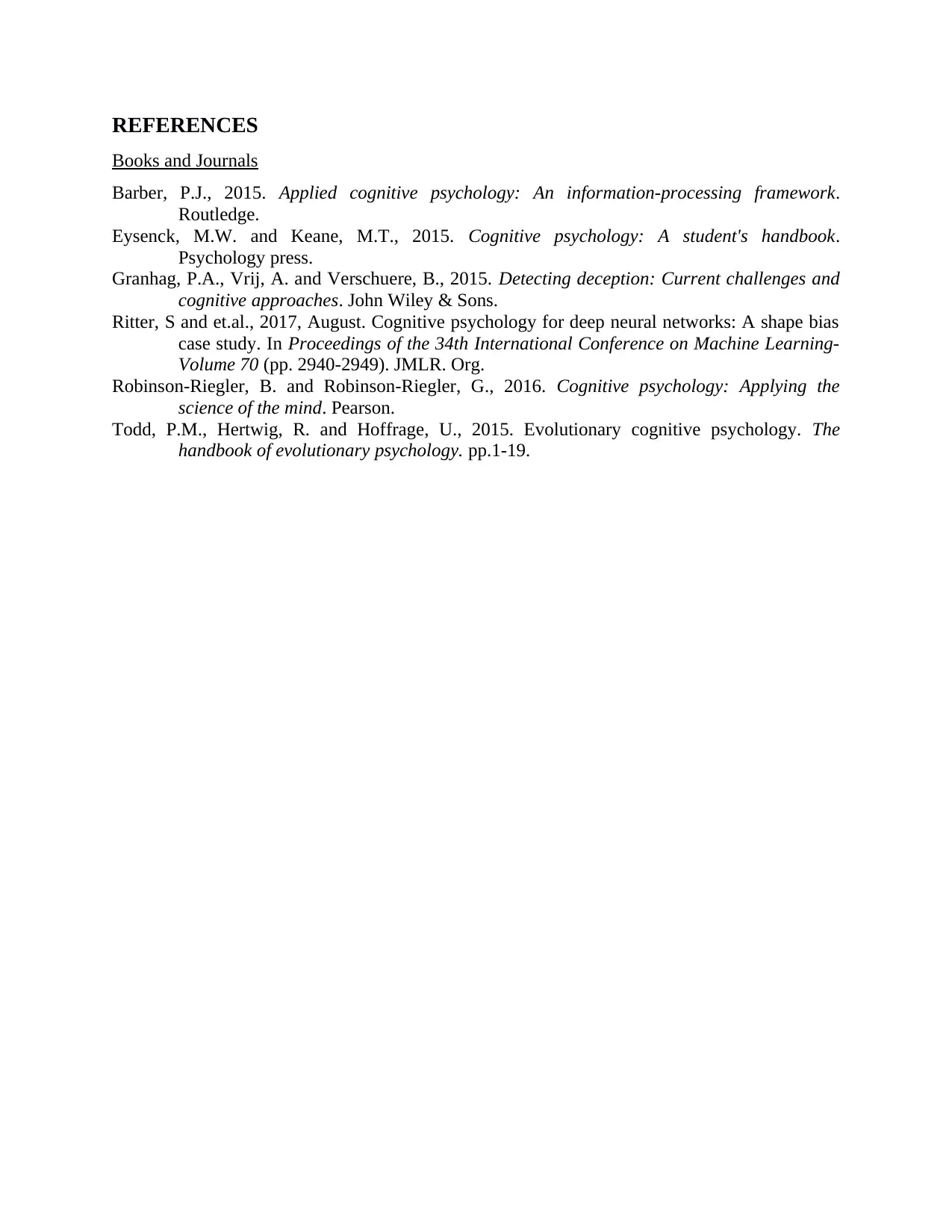
REFERENCES
Books and Journals
Barber, P.J., 2015. Applied cognitive psychology: An information-processing framework.
Routledge.
Eysenck, M.W. and Keane, M.T., 2015. Cognitive psychology: A student's handbook.
Psychology press.
Granhag, P.A., Vrij, A. and Verschuere, B., 2015. Detecting deception: Current challenges and
cognitive approaches. John Wiley & Sons.
Ritter, S and et.al., 2017, August. Cognitive psychology for deep neural networks: A shape bias
case study. In Proceedings of the 34th International Conference on Machine Learning-
Volume 70 (pp. 2940-2949). JMLR. Org.
Robinson-Riegler, B. and Robinson-Riegler, G., 2016. Cognitive psychology: Applying the
science of the mind. Pearson.
Todd, P.M., Hertwig, R. and Hoffrage, U., 2015. Evolutionary cognitive psychology. The
handbook of evolutionary psychology. pp.1-19.
Books and Journals
Barber, P.J., 2015. Applied cognitive psychology: An information-processing framework.
Routledge.
Eysenck, M.W. and Keane, M.T., 2015. Cognitive psychology: A student's handbook.
Psychology press.
Granhag, P.A., Vrij, A. and Verschuere, B., 2015. Detecting deception: Current challenges and
cognitive approaches. John Wiley & Sons.
Ritter, S and et.al., 2017, August. Cognitive psychology for deep neural networks: A shape bias
case study. In Proceedings of the 34th International Conference on Machine Learning-
Volume 70 (pp. 2940-2949). JMLR. Org.
Robinson-Riegler, B. and Robinson-Riegler, G., 2016. Cognitive psychology: Applying the
science of the mind. Pearson.
Todd, P.M., Hertwig, R. and Hoffrage, U., 2015. Evolutionary cognitive psychology. The
handbook of evolutionary psychology. pp.1-19.
1 out of 8
Related Documents
Your All-in-One AI-Powered Toolkit for Academic Success.
+13062052269
info@desklib.com
Available 24*7 on WhatsApp / Email
![[object Object]](/_next/static/media/star-bottom.7253800d.svg)
Unlock your academic potential
Copyright © 2020–2026 A2Z Services. All Rights Reserved. Developed and managed by ZUCOL.





